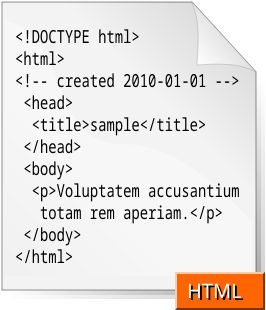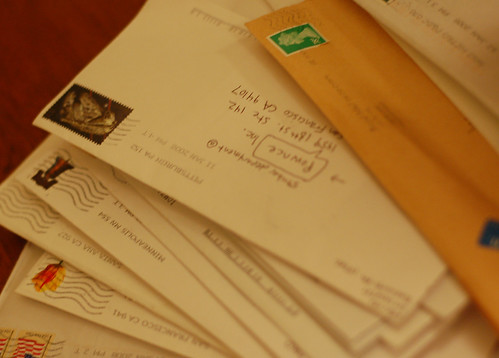Being a wordsmith is just plain hard. Writers have to face daily challenges like the affect/effect conundrum, the dreaded compliment/complement crisis and the altogether horrifying further/farther battlefield. Tackle all that and you've still got to think about dangling prepositions, misplaced modifiers and whether or not a semicolon is viable punctuation (for the record, I'm a firm believer that it is). But if you think knowing words is hard, just try learning HTML. Because you're going to have to, you know -- it goes hand-in-hand with being an indie author.
It's Raining Internet Code
Internet language is everywhere, though we rarely see it. HTML is the invisible force that drives every Tweet, every blog, every singly little thing on Facebook. It's also behind every ebook, and that's why it's relevant to you. You can't simply take your manuscript, convert it into an ebook and call it a day. Why? Because of HTML. Don't know it? You're going to have to learn.
You may not realize it, but you've been writing with HTML the whole you've been writing your book. It's invisible, but this code drives every word processing document you've ever created, too. And when you convert that document into something an eReader can use, you're playing with fiery Internet code. Try not to get burned.
No matter what conversion software you use, you're going to have to open up your ebook's HTML file and have a look. And you're probably going to have to remove a bunch of junk code from it, and add new code to it, and generally check the whole bloody thing line-by-line. It's a hassle, sure, but remember that your readers are going to be looking at it line-by-line so it's really the least you can do. Depending on how much formatting you actually have in your book, you might have a lot of crap to clean up. Every time you put a word in italics, or bold, or change the font you're creating all sorts of different HTML code -- so you'd better figure out what all that junk means.
Blank lines not showing up? Page breaks not appearing? It's not necessarily something you've done incorrectly in your document -- it's a problem with the HTML code itself. That's why you've got to use conversion software that allows you to play with that code (personally, I use Mobipocket Creator). Get to know basic HTML codes used in ebooks to get the look you want. You'll probably have to add your own blank lines (<br>) and add your own page breaks (<mbp:pagebreak />), depending on the program you're using. Once you know what to look for, it's easy enough to see the story instead of focusing on how strange the HTML looks. Without HTML, you can't add a Table of Contents, images or any of those fancy little extras that help ebooks stand out.
And if you don't take the time to figure it out, you've got a great chance of ending up with funny-looking formatting once the ebook conversion process is complete. Readers want perfection, and they deserve perfection. Don't deliver it, and they'll have an excuse not to tell others about how much they liked your book.
On the Other Hand...
I do know a shortcut if you'd like to skip all that HTML editing. Writers have to find little ways to save time. If you publish your book through Smashwords, they'll cleanly convert your book through their processing -- but you've got to make sure the document you submit adheres to their strict style standards. If you can beat the Smashwords autovetting system, you'll probably end up with a great-looking ebook. Be sure to select the option that converts your book in Kindle-friendly and Nook-friendly file formats. Then, you can simply download these versions and upload them to the bookselling sites of your choice. Because many authors use Amazon KDP, this isn't an option for everybody -- but it is a pretty sweet shortcut if you want to bypass all that Internet code.
























